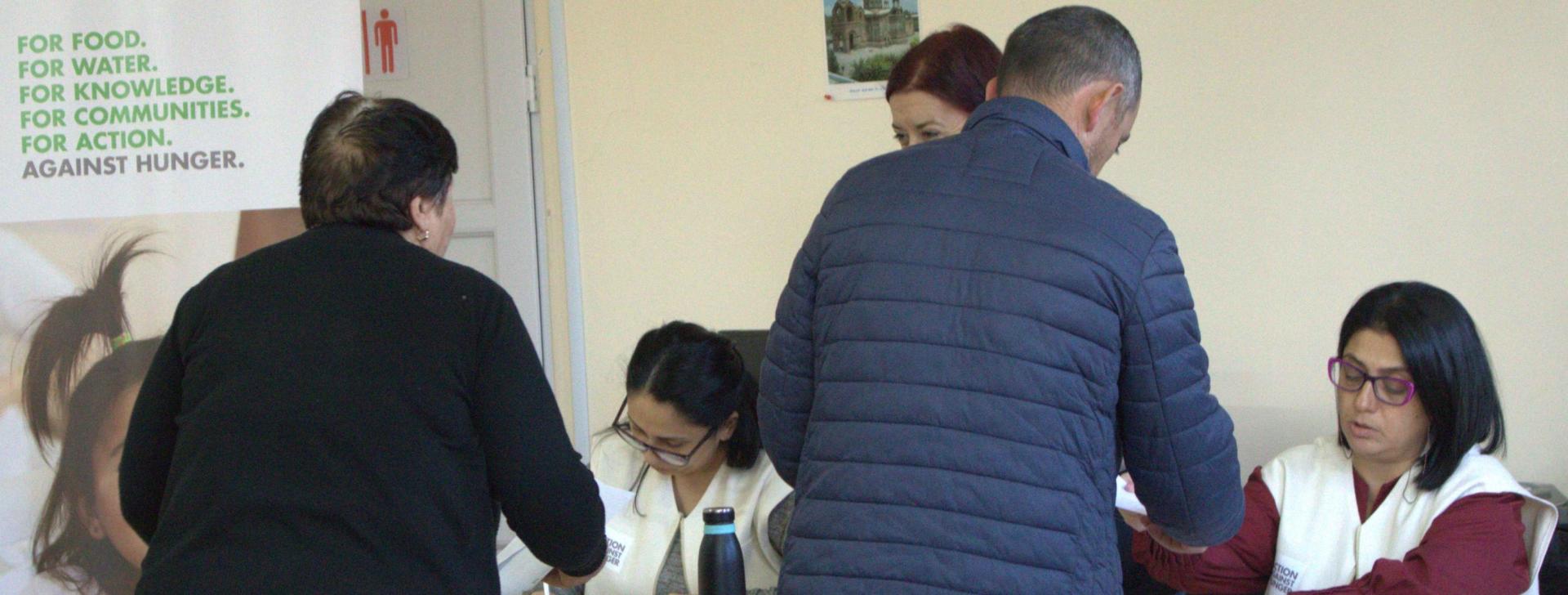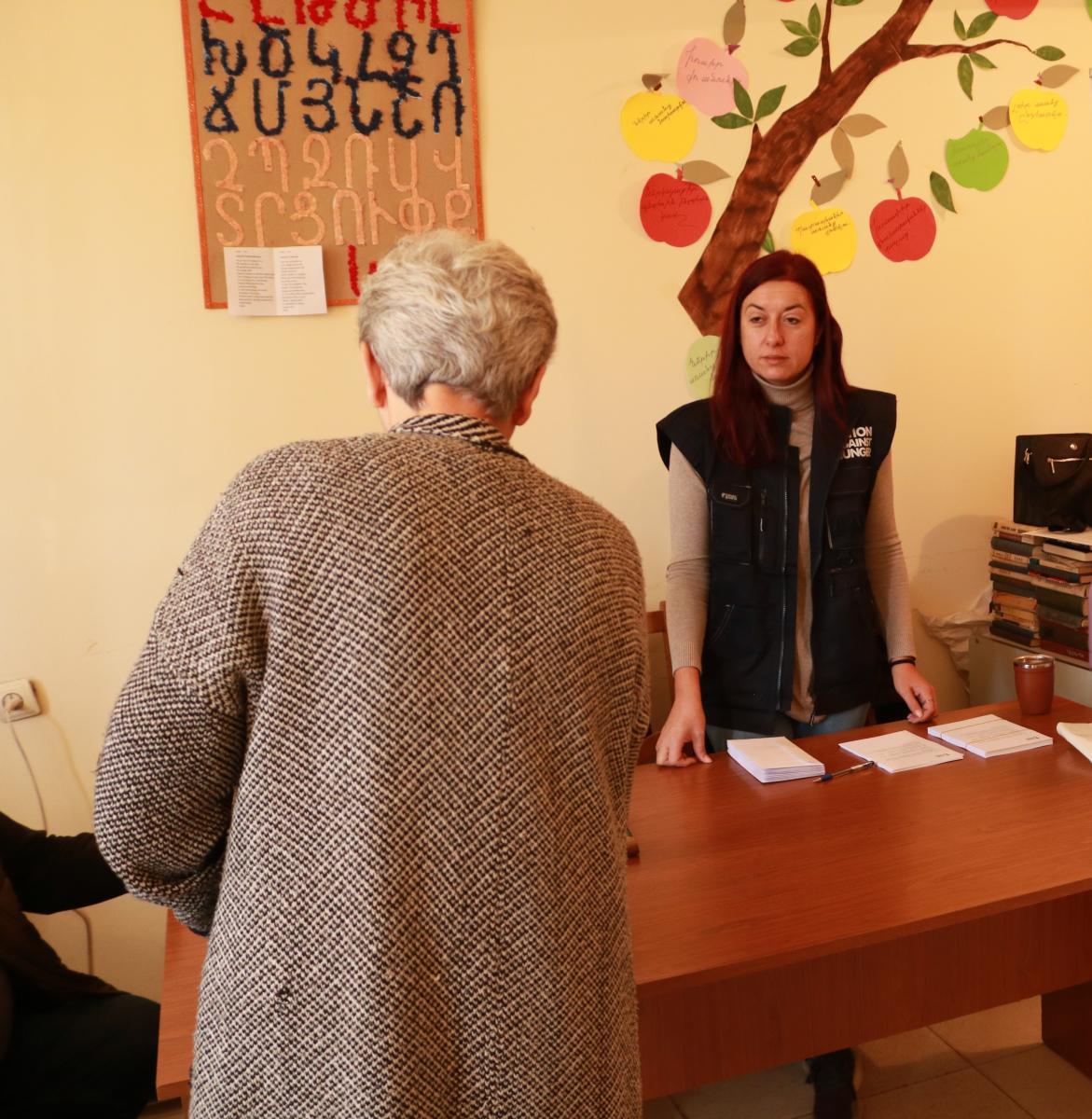

Action Against Hunger’s Communications Officer hears the stories from families displaced from Nagorno Karabakh
During a recent visit to the Charentsavan and Nor Nork multi-functional centres run by Mission Armenia, Action Against Hunger’s Communications Officer, Nicolas de Wergifosse, met with refugees from Nagorno Karabakh who had arrived in Armenia following the recent conflict in September 2023. Here are two of the stories he heard from those recently displaced by the conflict and now living in Armenia.
Since late September this year, Action Against Hunger, in partnership with People in Need and Mission Armenia, has been providing pre-paid supermarket cards to refugees with financial support from the START Fund. The refugees have been receiving these vouchers in Mission Armenia’s centre and with them they can purchase essential items such as food, hygiene products and household items. During my visit to the centres, I talked with some of the refugees that have been receiving this humanitarian support and listened to the hardship that they have experienced over the past two months.
Narine
Narine was born and spent most of her life in the town of Hadrut In Nagorno Karabakh where she worked for many years in the cultural centre and museum. In 2020, when Hadrut was bombed, she and her children moved to Stepanakert, as it was no longer safe to remain in their home. Shortly after, they had to move to Yerevan. Though her family later returned to Stepanakert, the renewed conflict this September meant that she had to leave again – which is the 3rd time that she has had to leave Nagorno Karabakh.
Currently, all 8 members of her family are renting an apartment in Yerevan. Although the building has heat and electricity, it has only one bedroom and one living room and rent is very expensive. In addition, they have additional medical expenses as her husband has experienced 2 strokes, as a result of the stress from the conflict, she says. While he has disability status and can get some support for his immediate medical needs from Yerevan’s health institutions, they still must pay for more specialized medicines. Therefore, the primary needs of the family remain largely financial, so that they can pay for the rent and medical services. Narine’s son, who was injured during the conflict, has since been trained by the ICRC as a hairdresser. Her son’s profession is currently the primary source of income for the family. There are also two children who are under 18 and who are attending school in Yerevan.
When I ask whether there was anything she would like to tell me she says that the situation was “really unexpected” and although her family are in Armenia, the situation remains a source of stress and anxiety, and so mental health support is very important.
Vazguhi
I met Vazguhi at the Charentsavan centre in Kotayk province. She expressed her gratitude for both the support that the centre was providing and for the opportunity to tell her story. Vazguhi and her family of eight arrived from Nagorno Karabakh to Armenia on the 28th and 29th September, at the end of the first week of conflict. This is the fourth time that Vazguhi and members of her family have had to leave their home due to conflict.
First, they went to Masis in the Ararat province and lived with a host family, but after some time they relocated to an apartment in Charentsavan, where they now live. Currently, this apartment is missing a number of amenities such as gas and a heating system. Therefore, the changing temperature as the winter approaches remains a huge cause for concern for her. Vazguhi says that, although they currently have clothes and bedding, they need a heater, warmer clothes and winter blankets for the coming months.
In her family, three of the children are of school age, but so far they have been unable to continue their education in Charentsavan as the number of refugees means that places in schools are in high demand. As for the adult members of the family, only her son has been able to find temporary work as a taxi driver. This situation is sadly one that Vazguhi knows too well. As she says, “My life started in this situation, and I have dealt with it all of my life. Even now, when I have grandchildren, we are still dealing with it.”

